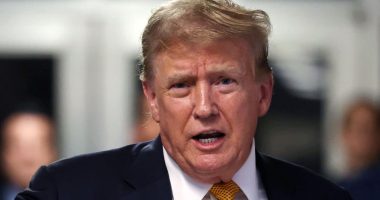Ahead of India’s elections starting this week Narendra Modi has lapped up acclaim from the country’s business elite, with many hoping for further easing of stifling investment restraints if, as expected, he wins another five years as prime minister.
At the Vibrant Gujarat summit in Modi’s home state in January, executives from Indian and foreign companies including the Adani Group and Suzuki pledged to invest billions of dollars and heaped praise on the Indian leader. Mukesh Ambani, Asia’s richest man, called Modi “the most successful prime minister in India’s history”.
A month later in New Delhi, Modi listed pro-business achievements, from stemming graft with digital infrastructure to new highways, and promised more in the future. “Even bigger decisions [are] coming in the third term,” he told his audience.
Modi has won plaudits for measures to help business during his decade in power as India has registered one of the world’s fastest rates of economic growth. From 2014, India rose 79 slots in the World Bank’s ease of doing business ranking before the league table was discontinued after 2020 due to data irregularities. Corporate tax rates have been slashed from 30 per cent to 22 per cent.
The world’s most populous nation has in turn found itself in a global sweet-spot. Global titans including Apple and Tesla are beating a path to its door, lured by a rising consumer class and the country’s promise as a potential manufacturing powerhouse outside China.
The wealth of India’s top business families and conglomerates has also swelled. Often seen as gatekeepers to outside investors, the likes of Adani, Tata and Ambani’s Reliance Industries hold outsized influence over the economy.

But in private many businesses still complain about India’s complex tax regulation, difficulties in acquiring land, rigid labour laws, weak intellectual property enforcement and clogged courts. It takes almost four years to enforce contracts in business disputes, among the slowest globally, according to the World Bank.
“Is the country better managed than it was decades ago? Undoubtedly so,” said a London-based executive with business in India. “Modi is a great marketer, but the ease of doing business is still not that easy at all.”
Modi has repeatedly invoked Viksit Bharat (Developed India), his vow to lift the country’s economy to developed status by 2047, when it celebrates its centenary of independence. NITI Aayog, the government think-tank, has been given the task of preparing a “vision plan” to make India a $30tn economy by then, compared with an IMF estimate of $4.1tn this year.
On Sunday, Modi’s Bharatiya Janata party released its election manifesto featuring a wide range of promises. The party pledged to improve India’s infrastructure, establish fast-track courts, turn the country into a global manufacturing hub and create “high-value” jobs.
Before the manifesto release, one government official said there would be faster movement on climate and technology goals. More funding is expected for what the government calls production-linked incentives, subsidies in areas such as semiconductors and electric vehicles.
“There will be a big push in manufacturing, with more PLIs,” said Ashok Malik, a partner at The Asia Group and head of its India practice. “I am also expecting a push against Chinese dumping and the rationalisation of duties on components to help global value chains.”

However, taxation rules remain a grinding concern for businesses. Many have been hit by abrupt changes in regulation and delays in reimbursement, with little recourse outside India’s congested court system.
“Forget the big picture, companies ask us questions like: ‘Will there be simplification of GST?’” said a Mumbai-based consultant, referring to the landmark, five-tier goods and services tax that Modi rolled out to displace a web of local-level tariffs.
Foreign groups have battled for years to quash retrospective penalties. India’s nascent gaming industry challenged a 28 per cent levy imposed on the sector last year.
“The prime minister is still concerned about the ease of doing business,” said another Indian official who regularly meets investors. “Taxation reforms are critical. We need to make it easier and more predictable.”

While Modi has built an image of being a competent economic steward, his micromanagement has had unintended consequences.
“Many firms say that the Modi government’s tendency to keep tweaking rules and laws in response to feedback, while understandable and positive, also makes it difficult to finalise business decisions,” said Pramit Pal Chaudhuri, South Asia practice head at Eurasia Group, who pointed to “ever-changing” digital sector regulations.
Moves during the Modi government’s first term to “aggressively” lift foreign investment restrictions have also slowed, said Richard Rossow, chair of US-India policy studies at the Center for Strategic and International Studies.
Barriers to overseas investment exist in almost 40 industries and easing those, “barring a few ultra-sensitive sectors, would inject investor confidence”, said Rossow. Investors want to see India, which is ponderously thrashing out free trade pacts with the EU and UK, deepen integration with global supply chains, he said.
While international businesses increasingly see India as a manufacturing alternative to China, greenfield investment remains stymied by difficulties in obtaining land, water connections and clearances needed by India’s 28 states, which Modi’s government has pushed to enact business-friendly policies.
India’s more than 400 labour laws make it one of the “worst in the world when it comes to hiring and firing”, said Eurasia Group’s Chaudhuri.
“Modi is public about his desire for India to have a market-based, private sector-driven economy,” he said. “But this view is not shared by much of the opposition and even the nativist wing of his own party.”
Observers believe the size of a Modi win when results are announced on June 4 will be key to overcoming those obstacles. Control of two-thirds of parliament would be needed to make changes to India’s constitution, which places strong controls under the ambit of India’s states.
In an interview with the Financial Times last year, Modi dismissed talk of amending the constitution as “meaningless” and toted progress his government had made without altering India’s fundamental body of law.
Still, “anything less than an ability to affect that change is going to be seen as a failure”, said the consultant in Mumbai.
Whatever the outcome, India’s massive and fast-growing economy means its draw for investors is unlikely to wane. Poonam Gupta, an economic adviser to Modi and head of the National Council of Applied Economic Research think-tank, said businesses should expect “big-ticket reforms” and consolidation of those already implemented.
“India is a very large market,” she said. “It still has a lot of surplus labour, cost of finance has come down. There is political stability, there is political commitment at the national level as well as the states. All of this is going to deliver results.”
Also Read More: World News | Entertainment News | Celeb News










